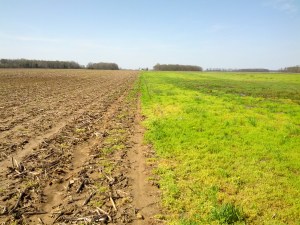Promising new research could automate weed-killing on the farm
By: Victor Martino
 Weeds are a pesky problem for farmers.
Weeds are a pesky problem for farmers.
But researchers and private companies – including numerous innovative start-ups – in the field of precision agriculture (agtech for short) are determined to make weeds less of a pesky problem for farmers.
For example, a research team from the University of Arizona believes it might have a solution to the age-old problem of weeds in cropland.
The University of Arizona-led research team (researchers from the University of California-Davis and Washington State University are involved as well) has developed a precision spray assembly it says is capable of delivering herbicides at the centimeter level of accuracy with minimal off-target spray at travel speeds of 2 miles per hour.
This is a huge improvement over the current methods of applying herbicides on the farm. Think of it as a rifle approach (precision). In contrast, the current methods of applying herbicides are more of a shotgun approach — you hit the target but also hit whatever is in its general path, which often can include the actual crop. It’s more of a scatter-gun approach.
According to Mark Siemens, a professor in the Department of Agricultural and Biosystems Engineering at the University of Arizona, the research is part of a multi-state (Arizona, California and Washington state) effort, the mission of which is to create a precision weeding machine.
“The current technology that is commercially available today is able to weed between the individual crop plants in the row but they are mechanical devices and leave a couple inches on either side of the plant to prevent damaging them. What our research is aimed at is trying to get the weeds that are very close to the crop that these commercial machines cannot remove,” Siemens says.
Part of the new technology includes an imaging system capable of identifying weeds and creating weed maps for targeted spraying, which is a truly high-tech approach.
The research team also is working on building what they call a spray manifold. They will integrate it with the imaging system. The combined elements will comprise a completely automated weeding machine, according to the researchers.
If successful, the automated weeding machine will not only result in less required herbicide use and expense for farmers, it also will have environmental advantages because precision spraying releases less herbicide into the air, which is an added plus.
According to Siemens, a major breakthrough in the research has been the ability to differentiate between crop plants and weeds.
Major advancements in artificial intelligence and deep learning technologies are what has enabled this achievement, essentially creating a smart weeding machine. This development is what will allow the automated spraying machine to be able to pinpoint weeds and avoid killing crops with herbicides.
The quest for smart-weeding machines is a major one in the U.S. and globally. Numerous existing companies, start-ups and university research institutes are working on various versions, using breakthrough developments in the fields of artificial intelligence, machine learning and deep learning.
Driving this demand in addition to labor considerations and the cost-savings (less herbicides required) such machines can provide farmers, is the fact consumers are increasingly demanding cleaner food, which includes the reduction in use of herbicides, pesticides and fungicides. For example, sales of organic foods have grown by an average of 10% annually over the last decade in the United States.
There’s also environmental concerns over herbicides and other chemicals, particularly in states like California, Oregon and Washington where the issue of chemical use in farming has significant opposition, and has become a hot-button consumer and political issue.
The fast-growing field of precision agriculture, or agtech, promises to bring advances like this to farmers in abundance.
At a recent agtech forum in Silicon Valley, experts in the field predicted precision agriculture has the ability to fully-automate the farm with smart machines like smart-weeders, along with smart machines that will be able to pick nearly every crop grown in California.
This is a very ambitious prediction. But if true it will be the most revolutionary change in farming since the tractor replaced the horse-drawn plow.
Experts predict we should see the commercial introduction of numerous sophisticated robotic or automated weeding machines in the next couple years, all using various artificial intelligence-enabled imaging techniques, which will allow the machines to clearly distinguish between crops and weeds.
Weather or not most farmers will be able to afford such machines is another question. But their development could open up a new business of contractors who for a fee do the weeding for farmers rather than the farmers needing to invest in their own smart machines. Think of it as the Uber (the ride-sharing service) for weed abatement.
The growing farm worker shortage is propelling agricultural technology. The simple fact is there are not enough people willing to do farm work. Technology is increasingly being seen, particularly in places like the Salinas Valley where growers must have an abundance of workers in order to pick the region’s fresh market crops, as the best way address the labor shortage issue.
The labor shortage exists from the field to the packing house to the processing floor. The same technology (artificial intelligence, machine learning, deep learning) that’s enabling the smart weeding machine being developed by the University of Arizona-led team is being used to automate crop picking, jobs in packing houses, and in fresh produce processing and distribution facilities.
Farmers will without question benefit from these technologies. But we must make sure the transfer of technology from research institution and private company to the farm is done right. A precision weeding machine does little good unless it’s adopted by farmers.
The next 10 years will be the decade of precision agriculture in California, the U.S. and globally.
The technological advancement is happening so fast it’s difficult even for experts in the field to keep up. Key to its success is an understanding of the technology and its benefits by farmers.
Weeds are a pesky problem for farmers. If farmers can be shown there’s a better and less-expensive way to eliminate them, they’ll be all in.
Now is the time to start explaining it to them.

By Victor Martino

